Marines say farewell to women-only battalion at Parris Island. How integrated is the base?
Lisa Taylor suffered through boot camp at Marine Corps Recruit Depot Parris Island 35 years ago. She did so in the Fourth Recruit Training Battalion, which for decades only trained women. On Thursday, she was back, sitting side-by-side with her old Marine buddies, including Desiree Johnson of St. Louis, Patricia Jester-Benefield, a Union, S.C. native and Yvonne Jones of Virginia. Taylor drove 10 hours from Maryland to say goodbye to the Fourth Battalion. That’s how much the experience meant to her.
The Fourth is being sunset as a result of training integration efforts among men and women at Marine recruit depots at Parris Island and in San Diego, the only two places in the country that train Marines.
But, while the historic all-female training battalion is being mothballed for the right reason, the Marines say, that doesn’t make the loss easier for the Marines like Taylor, who went through boot camp in March 1988. It’s where Taylor made life-long friendships. It’s where she learned discipline and attention to detail. It helped to make her into the women she is today.
“It’s like going back to your hometown and they knocked down your high school,” said Taylor, 57.
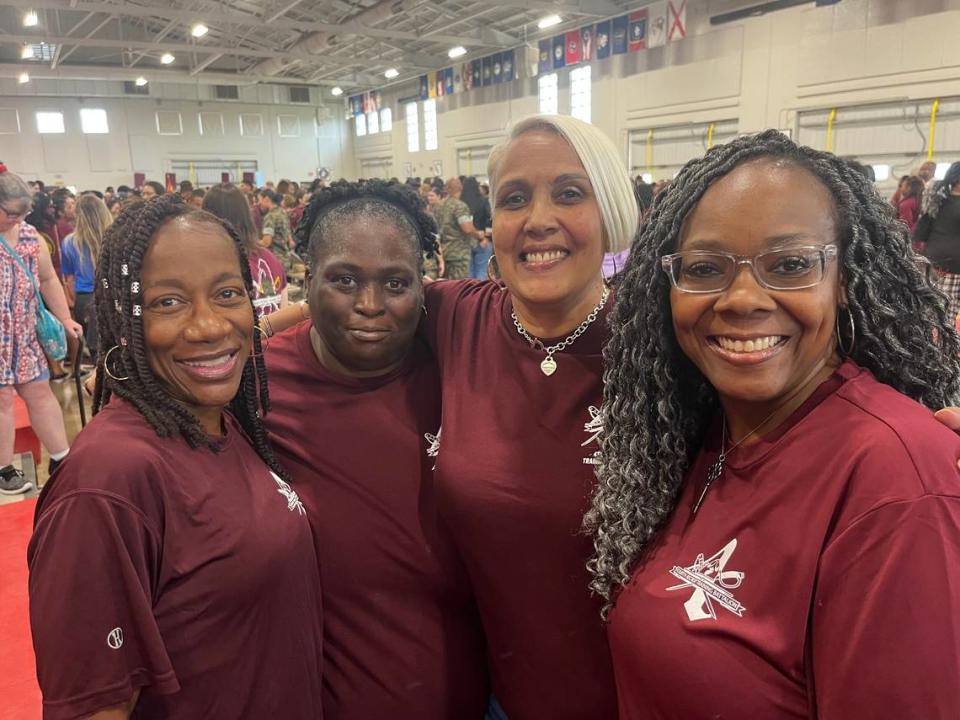
Since 1949, Parris Island, a palm tree-covered, bug-infested island on the coast of South Carolina known for its hellish heat and humidity, was the only place in the country where women could train to become Marines. It’s final iteration, which was created in 1986, was the Fourth Recruit Training Battalion.
Some 1,600 people attended a sometimes rowdy and emotional deactivation ceremony Thursday, including Taylor.
“These are the giants whose shoulders we stand on,” said Major Gen. Roberta Shea, pointing to several of the oldest Marines who were brought to the front to be recognized.
Thunderous applause followed.
About 13,680, or 8 percent, of the 171,000 active Marines are women.
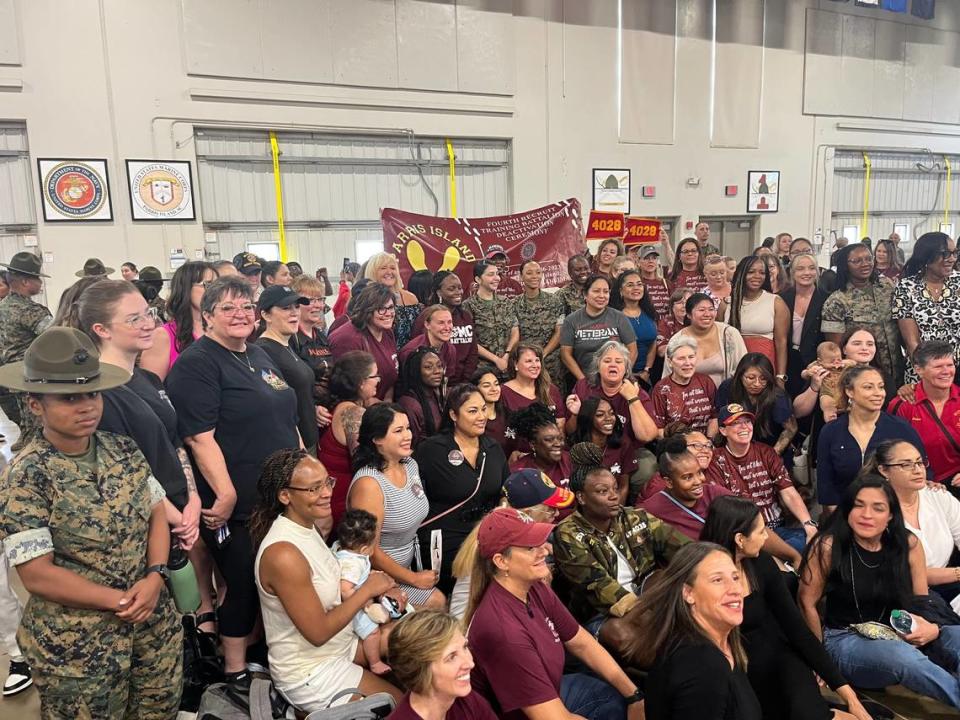
The 2020 National Defense Authorization Act mandated the Marine Corps to integrate training at boot camp — by 2025 at Parris Island and 2028 in San Diego.
Today, larger groupings of Marines called companies and battalions are integrated. That means women now train alongside men — even the grueling 54-hour Crucible, the final training test for all Marines.
But the Marine Corps remains the only service that maintains forms of gender segregation in its training program, said Sidra Montgomery, who was co-author of a University of Pittsburgh gender-integrated recruit training study prepared for the U.S. Marine Corps in 2022.
And male and female recruits are still organized into gender-segregated platoons, which are small units that make up companies, and trained by same-gender drill instructor teams, Montgomery said.
“At all the other services you have men and women in the same platoon and directly interacting a lot more in training events,” Montgomery said. “You also have mixed-gender drill instructor teams.”
The study recommended mixed-gender drill instructor teams and increasing the number and types of gender-integrated training events at or below the platoon level.
“That allows the Marine Corps to maintain the values and the fundamental things they hold sacred in the training process while also increasing training integration,” Montgomery said.
A third option offered in the report was integrating platoons, with men and women living separately, which the law requires, and then falling in together in the mornings for basic daily routine.
Neal Pugliese, a retired Marine colonel and the former director of operations at Parris Island who chairs the Beaufort County Military Enhancement Committee, said the closing of the Fourth is symbolic of changing eras, with women no longer training separately and barred from various military specialties.
“This is the culmination of the transition from what was once only females being trained at Parris Island to females being fully integrated down to the company level at Parris Island and San Diego,” he said.
The Marines are the “tip of the spear” with a combat arms focus, Pugliese said. Training, he said, should be compared to that mission, not other military branches.
Male recruits began training within Fourth Battalion in 2019. And since 2022, all recruits at Parris Island have been training in gender-integrated companies in the base’s three remaining battalions.
Marine Corps Recruit Depot San Diego also has begun training women recruits. As a result, the Marines say, the Fourth Recruit Training Battalion at Parris Island was no longer necessary.
The Fourth carries almost sacred meaning for those who trained under its colors, Marines say.
“It’s bittersweet,” said Hideshi Valle of California, who was having her picture taken in front of the sign for the old mess hall. “I’m a police officer. I understand change.”
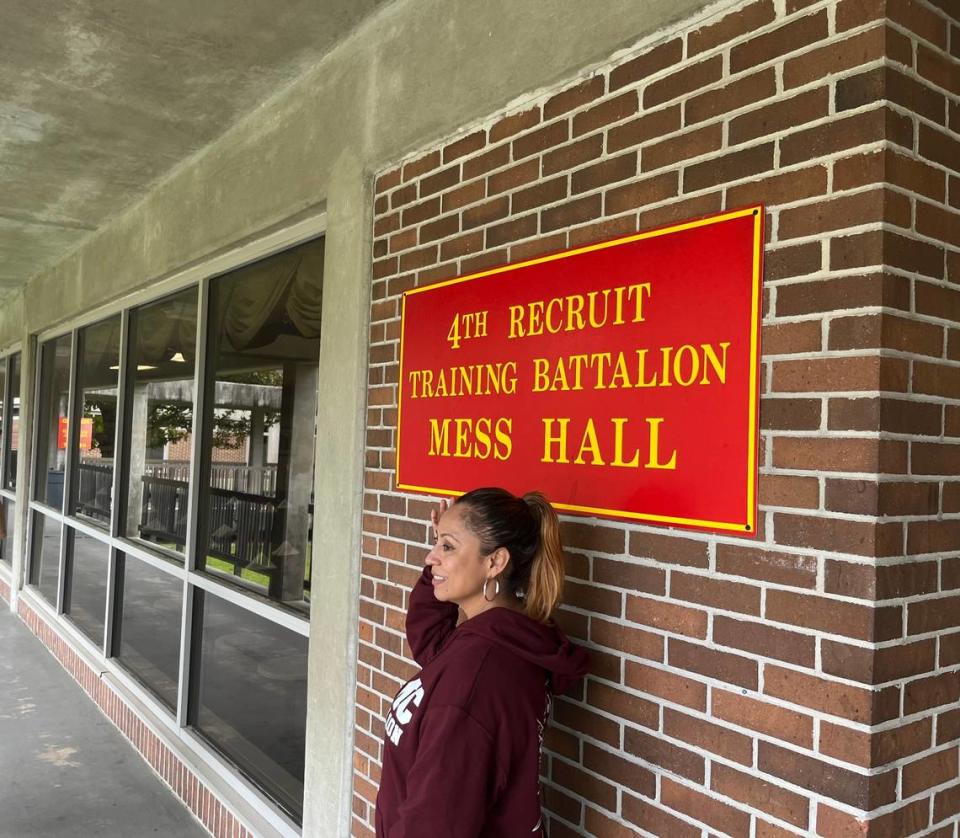
Touring Parris Island brought back many great memories for Valle, 40, who had wanted to be a Marine ever since was in middle school. The Fourth Battalion, she said, is where she became an adult, with the three months of training giving her leadership skills and pride in serving her community and country that was “life changing.”
“That just stays with you,” Valle said.
After learning about the deactivation ceremony, Renee Caseman of Las Vegas spearheaded an effort to get the word out, creating a Facebook page. She says the event should have been bigger.
“Sometimes females don’t get enough recognition — and a lot of us love what we did — and I wanted to bring us together,” Caseman said.
Caseman wore a T-shirt she had printed special for the occasion. It said, “I’m not like most women ... that’s where you made your first mistake.”
“We’re female Marines,” said Caseman with a smile, explaining the message.
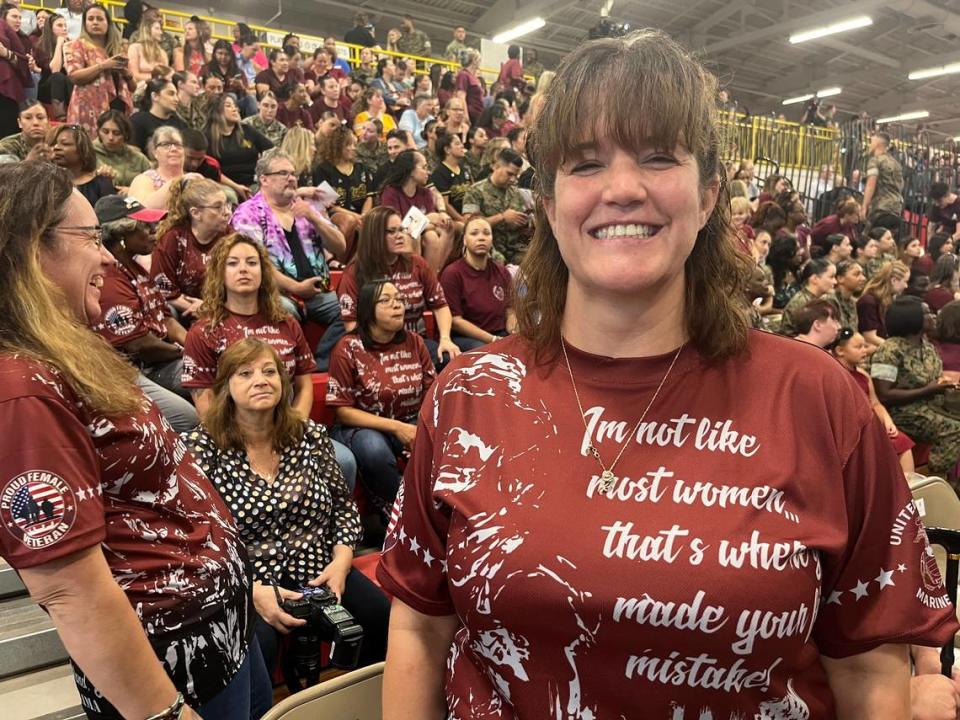
By deactivating the Fourth, Caseman said, “they’re showing there’s unity.”
The sign at Parris Island, she notes, says “We Make Marines,” not female or male marines. But she still has mixed emotions about the deactivation of the beloved Fourth.
Caseman went through boot camp at Parris Island in 2004. “You didn’t really see male Marines,” she recalled. The segregation of men and women, she thought at the time, was just the way it supposed to be.
For Maggie Hickman of Beaufort, a 40-year Marine who went through boot camp at Parris Island from November 1975 to January 1976, boot camp was “scary as hell,” she said, but during her career she also witnessed the first female drill instructors in the Marines. “Now that I look back, it was a milestone,” she says.
She’s pleased to see increased integration but sad for the loss the battalion.
“It’s a good day for the Corps,” Hickman said.

Taylor, the Maryland woman, wore a burgundy T-shirt displaying the flag and name of the Fourth Recruit Training Battalion on the back and so did her friends. They smiled and laughed and rose to their feet with the rest of the crowd, which roared with approval at references by Marine leaders about the Parris Island experience and the importance of the Fourth.
The Fourth Recruit Training Battalion is a big chapter in Marine history, Taylor said, and her own.
“I said, ‘If i could make it through boot camp, I could survive anything,’ Taylor said.
That’s why she couldn’t miss the chance to return to Parris Island.
Today, her daughter is an active-duty Marine.
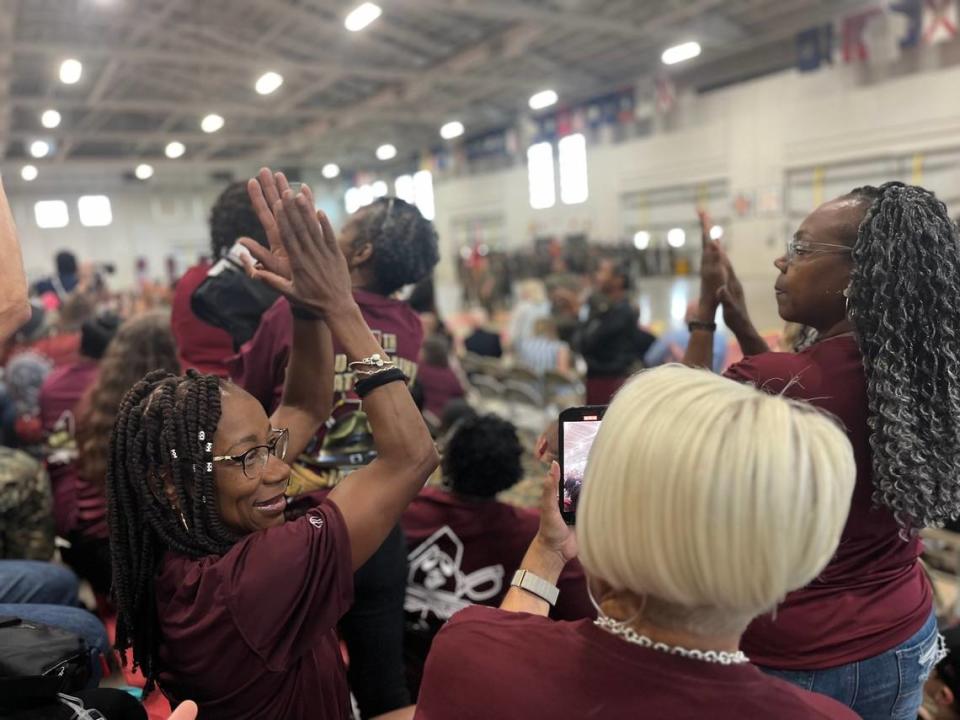

 Yahoo Sports
Yahoo Sports 